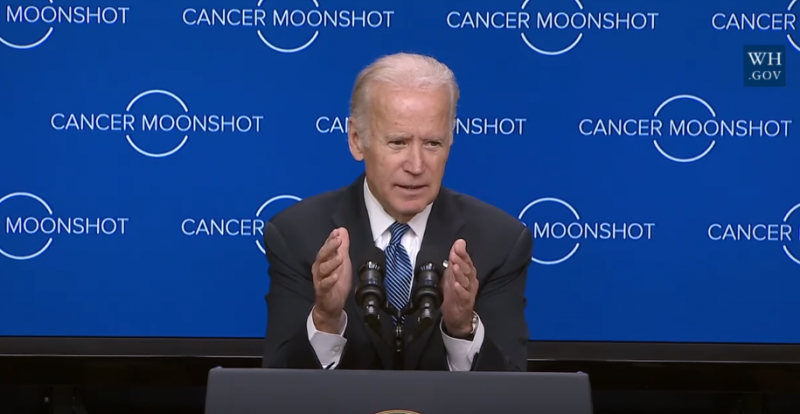Democrats gamble on climate crisis with infrastructure
The $1 trillion package doesn’t do enough to transition our country to sustainable transportation
President Joe Biden delivers a press conference for the Cancer Moonshot Initiative, an effort to use governmental resources for cancer research.
October 28, 2021
On Aug. 7, the Senate voted in an overwhelming majority to pass a $1 trillion bill that would restore much of the country’s faltering infrastructure. The bill, one of President Biden’s top domestic priorities, would only require the votes of a simple majority in the House of Representatives before the presidential administration signs it into law. $550 billion of the governmental budget is dedicated to new spending and investments while the remainder consists of previously approved funding. This level of spending could provide much-needed rehabilitation to America’s transportation and communication systems.
The first aim of the bill is to supply necessary improvements to public transportation. According to the U.S. Department of Transportation, over 45,000 bridges and about 20% of large roads and highways in America are in poor condition. The bill pledges $110 billion into “roads, bridges and major infrastructure projects” with an included $4 billion designated for “bridge repair, replacement and rehabilitation.”
Moreover, public transportation services will receive funds to increase public accessibility. $39 billion will be spent in an effort to modernize public transit, which would repair and upgrade transportation such as rail and bus fleets, while also making stations more accessible to elderly and disabled users.
Amtrak, in particular, would benefit from a $66 billion allotment for the elimination of their maintenance backlog and the modernization of the Northeast Corridor line.
Another $25 billion would be dedicated to improving airports, and $17 billion would go toward waterways and ports. In addition to all of these positive changes, the bill recognizes and attempts to remedy the fact that Black neighborhoods and communities are disproportionately separated by highway projects. The bill dedicates $1 billion toward the reconstruction of street grids in order to reconnect these communities.
The bill also provides upgrades to digital access and communication in accordance with President Biden’s aim to close the digital divide present in the nation. The organization PEW Trusts estimates that 40 million people, 40% of schools and 60% of healthcare facilities outside of urban areas do not have access to broadband. The infrastructure bill would pledge $65 billion towards making broadband more accessible, showing President Biden’s desire to invest in the working class and in rural areas.
Furthermore, power systems will be ameliorated. $65 billion would be allocated to rebuilding the electrical grid. $55 billion would go towards upgrading water systems with the intended goal of providing clean drinking water for the nation.
While the infrastructure bill would assist in making crucial — and overdue — alterations to the nations’ infrastructure, it does not accomplish enough in terms of climate action. The Democrats had originally planned to pledge more than $15 billion towards electric transportation.
However, these efforts to expand electric transportation were mitigated by the Republicans of Congress, many of whom seek to preserve the nation’s dependence on fossil fuels, which are large sources of revenue for the states that they represent.
Even if the bill does include $150 billion worth of funding to promote clean energy and reinforce infrastructure — it does not reflect Biden’s climate change-related campaign pledges. In no way does it incorporate key aspects of Biden’s climate plan, such as the Clean Electricity Standard or Civilian Climate Corps.
In the meantime, the infrastructure bill has gained immense bipartisan support, passing by a vote of 69-30. Nineteen Republican senators — including Senator Mitch McConnell, who has notoriously blocked Democrat-backed initiatives in the past — voted in favor. However, although the Democrats hold a clear majority in the House of Representatives, the House’s progressive caucus poses the largest threat to this bill.
The progressives have threatened to vote down the infrastructure bill unless it is passed concurrently with Biden’s sweeping $3.5 trillion social safety plan. The progressive caucus consists of 96 representatives, including the chair, Rep. Pramila Jayapal, who stated that the majority of her caucus will block the bill if it is voted on before the social safety plan has passed through the Senate.
Essentially, House progressives have adopted a strategy of mutually assured destruction. Unless they are able to successfully increase social safety nationwide, they will refuse to give moderate Democrats this bipartisan win. While this may seem reckless — an opinion many Republican policymakers have voiced — the progressives’ stand actually provides the potential to bring much-needed benefits to Americans that have been adversely impacted by the pandemic.
Among the benefits offered by the $3.5 trillion package are various childcare services that aim to make education more accessible through the expansion of child tax credit. The package expands Medicare benefits and would allow the negotiation of maximum fair prices for high-cost medication, such as insulin. It also invests in combating climate change to a much higher degree than the infrastructure bill, dedicating $150 billion in grants to subsidize clean energy, $13.5 billion to provide electric vehicle access to impoverished communities and $9 billion to alter the energy grid. Furthermore, the Democratic party does not need bipartisan support to pass the bill — with majorities in both houses of Congress, they would only require a simple majority for passage.
As a result of the pandemic, the poverty rate in the U.S. has risen to 11.4%. Moreover, unemployment soared to 14.7% in April of last year — the worst it had been since the Great Depression.
While Biden’s infrastructure bill is a step in the right direction, the fact remains that it is simply not enough. As indicated by Rep. Ocasio-Cortez, the infrastructure bill would only amount to $100 billion per year, which is the budget for New York City alone. Ultimately, the fate of Biden’s $3.5 trillion plan will reveal the dedication of the government towards the rehabilitation of our nation.























